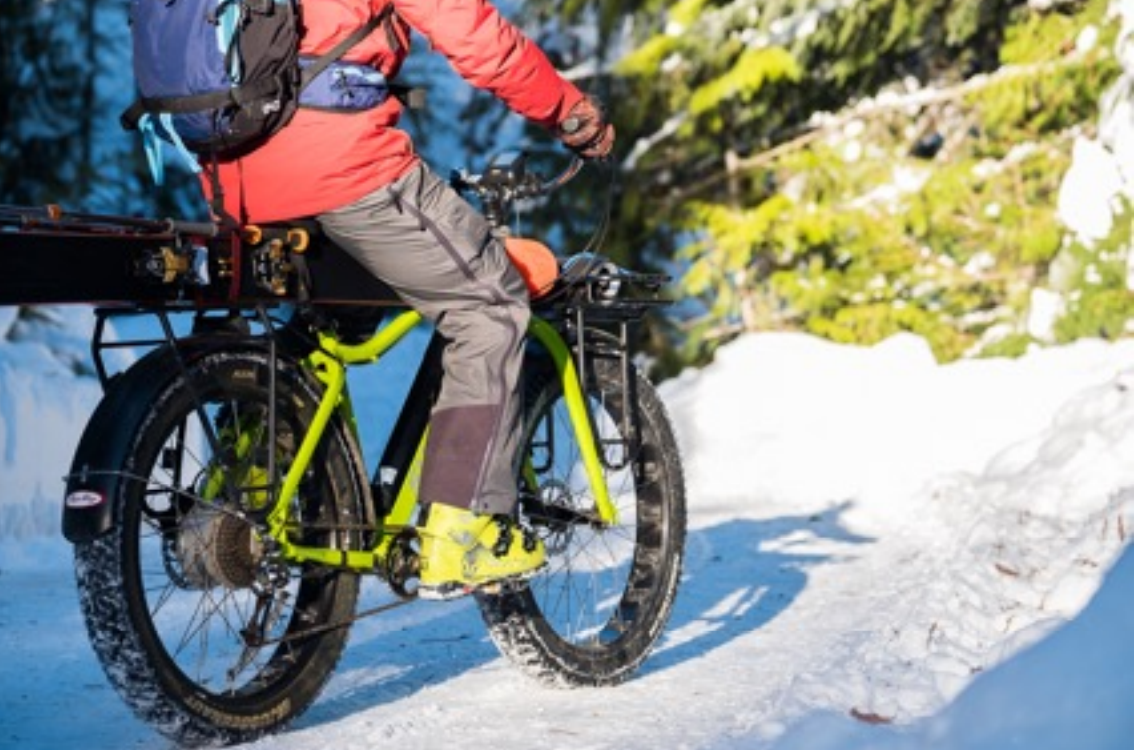Opinion: eBikes solve transportation problems
By Dave Heighway
You get some funny looks when people see you riding to the mountain on a fat bike with skis strapped to it, wearing your ski boots and goggles. Quite a few nods, smiles and thumbs up from people driving by, seemingly supportive of the idea. Of course, occasionally it’s not a thumb people have raised, but a different finger, which I assume is also a sign of support. Let’s chalk it up to cultural differences, after all Whistler is an international destination.
The fat bike I’ve been riding is actually an eBike. It’s part of an ongoing experiment in alternative transportation that started in 2012 when my buddy Rosie and I made the two-hour drive down to Vancouver to buy a couple that had just arrived at the warehouse of a company that was moving into eBikes and away from ATVs and dirt bikes.

Snow is not a problem for eBikes. Photo/Cory “Rosie” Leis
Of all the grand schemes the two of us have hatched on the chairlift over the years – and there have been many – the electric bike stands out because it really has become a game changing “life hack” for us; one of those clever ways peoplediscover to short-circuit the system and achieve their goals. In this case, we’ve managed to “hack” automobile transportation.
What makes an eBike so effective is the convenience: you park where you want and set your own schedule, you can carry what you need and still ride up hills without working up a sweat. For us that means we’ve mostly eliminated our need for a car, thereby drastically reducing our CO2 emissions and saving us thousands of dollars on repairs, insurance as well as the price of the car itself.
I personally get a lot of pleasure riding past the Husky station and not handing over 75 bucks for fuel. It’s a small – but genuine – divestment from the fossil fuel companies.
I know what you’re thinking: You’re being a hypocrite if you think you can claim to care about the environment and continue to live in a ski town like Whistler. After all, it’s CO2 emissions everywhere you look: open outdoor fireplaces, groomers, taxis, sleds-on-pickups and of course all those jets that bring the long-haul visitors. And it’s the visitors who’s dollars keep a resort like Whistler functioning. No fossil fuels, no happy resort town in the mountains, and no billion dollar annual boost to the provincial economy.
I won’t argue, I see the hypocrisy, and know it to be absolutely paralyzing if you strive to be eco-conscious. But there’s no denying the climate crisis is urgent and we need to find ways to move beyond paralysis and start enacting solutions. I think the environmentalist and Guardian columnist George Monbiot offers a way forward: “Hypocrisy is the gap between your aspirations and your actions. Greens have high aspirations – they want to live more ethically – and they will always fall short. But the alternative to hypocrisy isn’t moral purity (no one manages that), but cynicism. Give me hypocrisy any day.”
Here’s my interpretation: there’s some middle ground between living in a cave eating dirt and doing nothing about global warming, so do what you can.
So, riding a bike around town instead of driving isn’t going to solve the climate crisis, but it’s a meaningful step in the right direction, and one the Resort Municipality of Whistler (RMOW) agrees is a priority. According to the latest tally,Whistler is exceeding their GHG reduction targets in every category except transportation, where they’re actually going up. According to their website, “[r]educing personal car use is the most significant action individuals can take to reduce climate change in Whistler.”
But Whistler is not unique, there’s a lot of potential for bikes and eBikes to reduce carbon emissions across the continent, much as they have in Europe and Asia.According to the U.S. EPA, 25 percent (in Whistler it’s more than half) of total CO2 emissions come from transportation, and it’s estimated that half of all trips are less than 5 km (American Bicycle League). In Copenhagen and Amsterdam for example, 30 to 40 percent of all trips are made by bike, something like a wet dream for urban planners.
“Copenhagenizing” our communities in North America is a worthy goal, and technologies like eBikes that make riding a bike easier and more convenient will help us achieve it. Already there is growing evidence that a biking renaissance is under way. The good news is that you don’t have to go “Gonzo” like Rosie and I did. You can start turning the tide of growing emissions by simply replacing a couple of your car trips each week with a bike trip. It’ll make a significant and meaningful difference in your personal footprint, and perhaps more importantly, you’ll be sending a message to the people in your community that getting around by bike is normal. And when riding becomes normal, as it is in Copenhagen, we’ll be well on our way to low-carbon future.
Dave Heighway and Cory “Rosie” Leis live and ride in Whistler, B.C., and are the co-owners of iCleanCommute.com, a company that promotes eBiking as a way to bikify North America.


